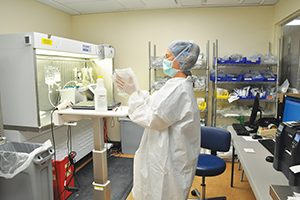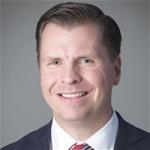By KEN LEISER
Civica Rx has announced that it will make 16 essential injectable medications that often are in short supply available to hundreds of U.S. hospitals, with deliveries expected to begin by the end of this year.

Beth Kilzer, clinical pharmacist at SSM Health St. Mary's Hospital – St. Louis, preps and checks for sterile compounding of magnesium to be administered intravenously to patients. SSM Health is a member of a generic drug company that is producing pharmaceuticals to relieve scarcity and price barriers in the drug supply chain.
Photo courtesy SSM Health
Five Catholic health ministry systems are among the more than 30 health systems that are members of the Lehi, Utah-based nonprofit generic drug company. Its member systems represent more than 900 U.S. hospitals. The 16 drugs will be the first in the Civica Rx product line. Civica Rx also has announced it will partner with the health care performance improvement company Vizient, to better anticipate supply chain shortages of specific essential drugs.
Civica Rx was launched in September 2018 to disrupt the generic drug market by alleviating chronic shortages of vital drugs and to set competitive conditions that support sustainable, fair pricing for drugs that are crucial tools in the hospital pharmacopoeia.

Liljenquist
Daniel Liljenquist, the chief strategy officer of Salt Lake City-based Intermountain Healthcare, conceived of the idea for a nonprofit drug company that could remedy market shortages of essential drugs and make product available at prices that could potentially discourage excessive price increases by other drugmakers. Liljenquist chairs the Civica Rx board.

Dredge
Carter Dredge, SSM Health's chief transformation officer, was assistant vice president for health care services at Intermountain when Liljenquist was mapping out the business plan for the generic drug company start-up and he is a member of the Civica Rx board. "We came up with the derivative value financing structure," Dredge told an audience at a breakout session at the AHA Leadership Summit in San Diego last month.
Civica Rx initially raised $100 million — $70 million from health systems and $30 million from health care philanthropies — all of which became governing members. Newer members since have contributed an additional $60 million in capital.
"If you raise money from the people who buy the drug, there is no equity in the company. In the end there is no incentive to increase the price of the drug," Dredge said.
The goal of Civica Rx is not to produce all needed drugs, rather "the goal is to act to some extent as a conscience" for the generic drug industry. "As long as you are making a fair margin, great, keep going. If someone starts to get really greedy in their pricing mechanisms, we are going to come in," Dredge said of Civica Rx.
Liljenquist said of Civica Rx: "Our goal is to stabilize the market — to make sure that essential generic medications are available and affordable to everyone."
The short list
In May, Civica Rx announced it will partner with Xellia Pharmaceuticals of Copenhagen, Denmark, to produce the antibiotics vancomycin and daptomycin for purchase by Civica Rx member health systems' hospitals. Both drugs are potentially lifesaving. Liljenquist said vancomycin, a broad-spectrum antibiotic used to treat drug-resistant infections in hospital settings, was the No. 1 drug on the Civica Rx priority list. Daptomycin often is held in reserve for the very severe, multidrug-resistant infections.
In late July, Civica Rx announced it had entered a five-year agreement with Hikma Pharmaceuticals PLC, a multinational generic drug company. London-based Hikma will make 14 essential sterile injectable medications including drugs hospitals commonly use in emergency care, in surgery, for pain management and in the treatment of hypertension. Civica Rx will distribute the drugs to its members under its private label. The list of 14 drugs had not been made public as Catholic Health World went to press.

Kharbat
Mohammed "Mo" Kharbat, regional vice president of pharmacy services for St. Louis-based SSM Health, said vancomycin has been on SSM Health's "shortage list," which is used to track drugs that are not available or could become unavailable. Vancomycin is "extremely important clinically," because it treats potentially deadly infections, he said.
Kharbat is based in Madison, Wis., and represents SSM Health on pharmaceutical matters in the Civica Rx initiative. SSM Health is a founding and governing member of Civica Rx as are Trinity Health and Providence St. Joseph Health. (Another governing member, Catholic Health Initiatives, combined with Dignity Health to create CommonSpirit Health, which now has a seat on the Civica Rx board.) Hospital Sisters Health System is a founding member of Civica Rx.
Public utility model
The idea for the structure of Civica Rx — "essentially our own public utility model that nobody would own, and nobody would try to monetize and take public" — came to Liljenquist while he was running on a treadmill in August 2016.
"This model is open to everybody," Liljenquist said. "We want everybody to be with Civica in this model. Nobody owns this company. Every health system no matter how big or how small will get the same per-unit price. There will be total transparency on what it costs Civica to make the drugs."

Fierens
Lou Fierens is executive vice president of administrative services at Livonia, Mich.-based Trinity Health and a Civica Rx board member. He said that apart from networking inside the industry, there is no real desire by members of Civica Rx to trumpet the company's accomplishments.
"It is more about the deeds, than the words," Fierens said. "Since Civica Rx is solving problems that are very deeply and consistently felt throughout the health care industry, we find ourselves having to facilitate, rather than generate, interest in participation," he said.

Sanford
Kathleen Sanford is executive vice president and chief nursing officer for Chicago-based CommonSpirit Health and a Civica Rx board member. She said the model has stirred interest and a "real excitement" in the health care industry. "Everywhere I go people ask me about them," Sanford said.
Long history of drug shortages
In June, Civica Rx and Vizient announced that Vizient will help Civica Rx anticipate gaps in drug availability and affordability. Dan Kistner, group senior vice president of pharmacy solutions at Vizient, said the two companies share the same mission. Vizient is a health care performance improvement company whose stated mission is to "connect health care organizations and providers with the knowledge, solutions and expertise that enable them to accelerate their clinical and operational performance."

Kistner
"Drug shortages are not a new thing," Kistner said. "They have been around really for the last 20 years and it's been really bad, in particular, in the last decade."
In a recent survey, Vizient found that U.S. hospitals waste $359 million of labor every year trying to manage drug shortages. It amounts to 8.6 million hours of physician, pharmacist and clinician time spent annually responding to drug shortages. Kistner said Vizient maintains a clinical webpage where its members can share protocols and alternatives for use when a vital drug is in short supply. "We try to take the best practices from our members and then we share them with everyone else," Kistner said.
Sanford said, "I can make rounds in any of our hospitals on any given day and in the pharmacy, there is a white board listing which drugs are in shortage that day. There's always a list."
When drugs are in short supply, the hospital will look for "spot buying" opportunities and will share drugs among facilities, which can take time and energy, Sanford said. In some instances, CommonSpirit will go to a compounding pharmacy vendor as a last resort, which is an expensive source.
Drug shortages "put pressure on us as a health system," Kharbat agreed. Once a health system obtains an alternative product, clinicians will have to know how to dose the drug and administer it safely, so "that also has an impact on our clinicians."